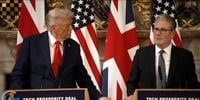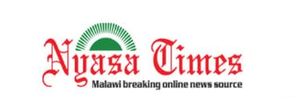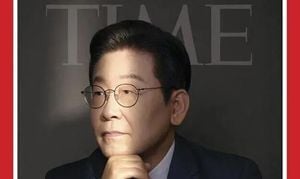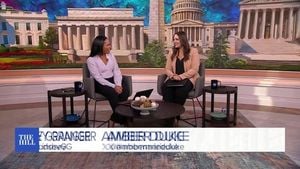President Donald Trump’s recent state visit to the United Kingdom was a spectacle of royal pageantry and high-stakes politics, marking a pivotal moment in the transatlantic relationship as both nations confront a world in flux. Over three days filled with ceremonial banquets, business summits, and a much-watched joint press conference, Trump and British Prime Minister Keir Starmer put their countries’ “special relationship” on full display—while also revealing the sharp edges that persist beneath the diplomatic surface.
The visit, which concluded on September 18, 2025, began with the kind of royal hospitality that Britain is famous for. Trump and First Lady Melania Trump were feted at Windsor Castle by King Charles III and Queen Camilla, with Prince William and Princess Kate joining in the formalities. The state banquet was a lavish affair, featuring delicacies like Hampshire watercress panna cotta and organic Norfolk chicken, and the table settings alone took weeks to prepare. According to NBC News, the symbolism of these events was not lost on either side; state banquets, as royal commentator Katie Nicholl noted, are “hugely important because there is so much symbolism in it.”
But after the grandeur, the visit quickly shifted gears to the pressing challenges facing both governments. At Chequers, the prime minister’s storied country residence, Trump and Starmer met for a bilateral summit that tackled the wars in Ukraine and Gaza, the future of NATO, and a newly announced U.S.-U.K. technology partnership. The leaders emerged for a joint press conference, each eager to underscore the enduring alliance. “We’ve renewed the special relationship for a new era,” Starmer declared. “The United States and the United Kingdom stand together today as first partners on defense, first partners in trade.” Trump echoed the sentiment, calling the U.S.-U.K. bond “like no other anywhere in the world.”
Yet, as the world watched, key differences came to light—most notably over the United Kingdom’s plan to recognize a Palestinian state at the upcoming United Nations General Assembly. Trump didn’t mince words: “So I have a disagreement with the Prime Minister on that score. Okay. One of our few disagreements actually.” Starmer, for his part, clarified that while he supports Palestinian statehood, “Hamas, a terrorist organization, can have no part in any future governance in Palestine.” The prime minister emphasized the need for a comprehensive peace plan, insisting, “We need aid to get into Gaza at speed. And so it’s within that context of a plan for peace, which we’re working hard on ... that the question of recognition needs to be seen.”
The two also addressed the ongoing war in Ukraine and their efforts to bring Russian President Vladimir Putin to the negotiating table. Trump, once optimistic about his rapport with Putin, admitted disappointment: “The one that I thought would be easiest would be because of my relationship with President Putin. But he’s let me down. He’s really let me down.” Starmer was even more direct, condemning Putin’s recent escalation. “In recent days, Putin has shown his true face, mounting the biggest attacks since the invasion began with yet more bloodshed, yet more innocents killed. An unprecedented violation of NATO airspace. These are not the actions of someone who wants peace.”
The summit also yielded tangible economic results. The leaders unveiled a new tech partnership, which Starmer described as “a blueprint to win this new era together.” U.S. tech giant Palantir announced a $2 billion investment in the U.K., creating hundreds of jobs and making Britain its European headquarters for defense. Starmer highlighted “huge new investments” from companies like Nvidia, Google, and Salesforce, calling it “the biggest investment package of its kind in British history by a country mile.” Trump, meanwhile, hailed the partnership as “historic” and emphasized its role in strengthening both countries’ positions in artificial intelligence and cybersecurity.
Outside the negotiating rooms, the visit was not without controversy. The Australian Broadcasting Corporation was barred from the joint press conference, an exclusion that raised eyebrows given Trump’s earlier clash with an ABC journalist. Downing Street attributed the move to logistical reasons, but the timing fueled speculation about press freedom.
Back in Washington, the political reverberations continued. The Trump administration asked the Supreme Court to allow the president to fire Federal Reserve board member Lisa Cook, signaling an ongoing effort to reshape the traditionally independent agency. In Congress, heated debates raged over crime in the nation’s capital, with Washington Mayor Muriel Bowser and other officials testifying before the House Oversight Committee. Trump recently threatened to federalize the city’s police force if it didn’t cooperate with federal immigration authorities—a move that drew sharp criticism from D.C. Attorney General Brian Schwalb, who argued that such measures “threaten to destroy critical trust between local communities and the police.”
Meanwhile, free speech emerged as a flashpoint. The suspension of “Jimmy Kimmel Live!” by ABC, following threats from FCC Chairman Brendan Carr, sparked outcry from Democrats and media advocates. Senate Minority Leader Chuck Schumer called Carr “one of the greatest threats to free speech America has ever seen,” demanding his resignation and urging Trump to fire him. Former Vice President Kamala Harris weighed in as well, blasting what she called an “outright abuse of power” by the administration and warning that “media corporations—from television networks to newspapers—are capitulating to these threats.”
On the international stage, security concerns loomed large. The assassination of conservative activist Charlie Kirk in Utah led the Secret Service to assign security details to White House officials Karoline Leavitt and James Blair, a precaution taken “out of an abundance of caution,” according to federal officials. Turning Point USA, the organization Kirk co-founded, announced that his wife Erika Kirk would take over as CEO and chair, in line with Kirk’s wishes.
As the United Nations General Assembly approaches, both Trump and Starmer are expected to keep these global issues at the forefront. Trump is slated to address the assembly on September 23, where his remarks on Ukraine, Gaza, and the future of the U.S.-U.K. alliance will be closely watched worldwide.
For all the ceremonial unity and diplomatic optimism, the visit laid bare the complex realities shaping the transatlantic partnership—differences on Middle East policy, domestic political battles, and the ever-present test of leadership in turbulent times. As both countries look ahead, the world will be watching to see whether the “special relationship” can weather the storms ahead and deliver on its promises of security, prosperity, and peace.




